In This Episode << SLIDE LEFT TO SEE ADDITIONAL SEGMENTS
Evangelicals and Culture
BOB ABERNETHY, anchor: Now, part three in our series on America’s evangelicals — the largest group of Protestant Christians. Today, evangelicals and the secular world around them: who is having the greater influence on whom? Our national survey, conducted with U.S. NEWS AND WORLD REPORT, found enormous concern about the impact of the secular world on evangelicals’ family values.
For instance, nearly three quarters of white evangelicals said the media are hostile to their values. As a result, evangelicals — more than other Americans — try to prevent their children from watching objectionable movies and TV. Also, they’ve created their own widely popular alternative music and books.
Jeff Sheler takes a close look now at evangelicals and culture.
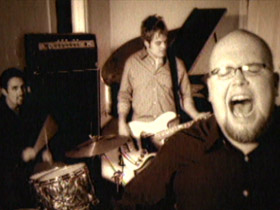
JEFF SHELER: MercyMe is a Christian band gone mainstream. Their hit single “I Can Only Imagine,” a song about heaven, not only appeals to young evangelicals but reached number four on BILLBOARD’s adult contemporary chart.
Christian pop star Stacie Orrico looks and sounds like other pop singers, but her crossover hits speak about finding more to life than material goods.
Cece Winans won seven Grammys as a gospel singer. Now her songs are making it on the R&B and adult contemporary music charts.
And the rock group Switchfoot got its start in Christian music but now is marketed as a secular band. Its videos are played on MTV.
From pop music to politics, evangelicals have become a much more visible presence in American culture. Their churches are energetic and growing while many mainline denominations are languishing. Their books have become fixtures on national best-seller lists. Their colleges are attracting students in record numbers.
Boston College sociologist Alan Wolfe thinks the cultural impact of evangelical Christianity is unmistakable.
Dr. ALAN WOLFE (Sociologist, Boston College): It’s extremely influential. It’s certainly the most rapid-growing of all of our religions. It’s had an enormous impact on the society. Just look at who the President of the United States is.
SHELER: Yet evangelicals have always struggled over their relationship to the larger society. The New Testament teaches Christians to be “in the world” but not “of the world.” Evangelicals traditionally have interpreted “the world” to mean non-Christian society. “Worldliness” to them meant sinfulness and was to be avoided. So they created their own parallel institutions and entertainment, to preserve and promote their values.
But since the mid-twentieth century, evangelicals have become increasingly engaged with the broader culture — as a means of spreading their faith.
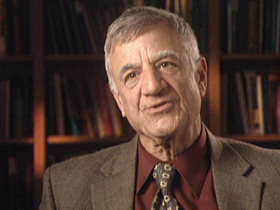
Dr. WOLFE: Evangelicals can’t ignore the culture. Their whole religious sensibility is based upon meeting the culture halfway. At the same time, American culture — just like American religion — is an enormously powerful force. It will change religion, just as religion will change culture.
SHELER: Steve and Sharon Clausen are third-generation evangelicals who worship with their four teenage children at Christ Community Church in St. Charles, Illinois. Like three quarters of American evangelicals, the Clausens believe they are part of the cultural mainstream, but sometimes they feel besieged.
SHARON CLAUSEN (Member, Christ Community Church, St. Charles, Illinois): We want our kids to make a difference in this world. We don’t want to take a light, which we thought our kids were going to be in a dark world, and haul them away somewhere, so we decided we will put them in a public school setting and let them shine.
But when things happen in public school — the kids will bring home different things saying there had been a drug bust or things like that — all of a sudden the walls close in, and I do feel like I’m in the minority, and I do get tempted to yank my kids out and home-school them, sequester them, and protect them.
SHELER: Steve says he’s trying to guide his sons on sexual morality, but it’s an uphill fight.
STEVE CLAUSEN (Member, Christ Community Church, St. Charles, Illinois): My young men are being bombarded on a daily basis, whether it’s through television, through SPORTS ILLUSTRATED swimsuit issues, through walking the hallways of school, through the locker room banter. It’s a real battle for my boys.
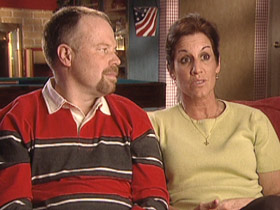
Ms. CLAUSEN: Sometimes I want to get out there and say to these parents of girls, “Please do us a favor. Help our boys to stay pure, because when girls are dressing like that, it’s really tough.”
SHELER: Like over 80 percent of evangelicals, the Clausens worry about too much sex and violence in entertainment and closely monitor what their children see.
ALI CLAUSEN (Member, Christ Community Church, St. Charles, Illinois): My friends go to a lot of movies that are not really good movies. Last night I got asked to go to a movie with my friends, and I refused because I knew I wasn’t allowed to watch that movie.
SHELER: Sometimes, the kids admit, the peer pressure can be daunting.
CODY CLAUSEN (Member, Christ Community Church, St. Charles, Illinois): It makes me feel left out maybe a little bit. It’s probably good that I’m left out of that kind of stuff because it’s God’s protection on me. But overall, it doesn’t feel good.
Ms. CLAUSEN: The biggest thing that bothers me about culture is the “no fear” thing. I think it came in with THE SIMPSONS — that you don’t fear adults. There is no respect for authority, and I think it has slowly torn away at our youth. We are taught to fear God. We are taught to respect God, respect authority, and respect parents, and that’s a huge thing for me as a mom to fight against all the time.
SHELER: The Clausens’ eldest son, Taylor, attends Wheaton College, an elite liberal arts school just outside Chicago. Wheaton is the flagship of a network of evangelical colleges, nearly 100 in all, whose enrollment has soared during the past decade.
Dr. DUANE LITFIN (President, Wheaton College): The mission statement of Wheaton is that we are interested in developing whole and effective Christians to impact church and society worldwide for Christ and his kingdom.
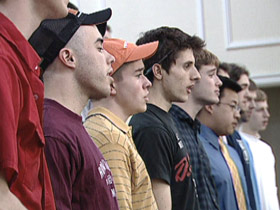
SHELER: Wheaton grads have had plenty of impact. Among the most famous: evangelist Billy Graham and Speaker of the House Dennis Hastert.
(To Dr. Litfin): What makes a Christian college education distinctive?
Dr. LITFIN: They get a full liberal arts education at a place like Wheaton. But what does it mean to think Christianly about subjects? What does it mean to take a Christian take, to try to think in terms of what the Bible teaches or what historic Christianity has said?
(Wheaton College Students): The very nature of creation is that God allows us as human beings to have choice.
Dr. LITFIN: These are the kinds of perspectives that are brought in a setting like this, and students are helped to think things through for themselves.
ASHLEY WIERSMA (Student, Wheaton College): My marketing class right now is doing a really good job of integrating faith and learning from an ethical standpoint.
SHELER: Wheaton and other evangelical schools are sometimes criticized for requiring faculty to sign statements of faith, pledging fidelity to key evangelical doctrines.
Dr. WOLFE: Evangelicals say it’s the individual himself or herself that should find a personal relationship with Jesus. But then when you have a faith statement and you have to sign it, and it’s a pledge, you’re taking away that voluntary character.
Dr. LITFIN: We are teaching here from a Christian worldview, we are not just teaching about the Christian worldview. We are looking for people who themselves embody it.
SHELER: Also controversial, Wheaton students must sign a pledge prohibiting them from drinking and smoking. Until recently, the pledge even forbade dancing.
GRADY ROOT (Student, Wheaton College): I don’t have a problem with the pledge. A lot of people say that the pledge is restrictive, it keeps us from drinking and smoking and stuff like that. But I find those are things that I would choose to do regardless of whether or not I had a pledge.
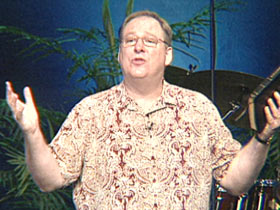
SHELER: Wheaton dropped its ban on dancing just last year and, for the first time, held two on-campus dances — another sign that evangelicals sometimes blend in as they engage the wider culture.
But Christian pop culture also has an impact.
RICK WARREN (Pastor, Saddleback Church, Orange County, California): Really, THE PURPOSE-DRIVEN LIFE is about doing the will of God, saying “God, not my plan, your plan — not my will, your will.”
SHELER: Pastor Rick Warren of Saddleback Church in Orange County, California, is author of the runaway best-seller, THE PURPOSE-DRIVEN LIFE. It has sold more than 15 million copies and topped the NEW YORK TIMES advice best-seller list for weeks, promising to “reduce stress and simplify decision making” by pointing readers to Christ.
Mr. WARREN: Jesus said you find your life by losing it. By giving your life away in service, you find fulfillment. The world thinks fulfillment comes through salary or through success or through status or through sex. But actually, the Bible teaches, fulfillment comes through service.
Dr. WOLFE: I think he’s just simply put his finger on an unease that lots of Americans are feeling, that somehow their lives aren’t organized to a particular purpose. I see his book as appealing to many kinds of people, and not just evangelicals.

SHELER: Other Christian books have been major best-sellers. The “Left Behind” series, action- packed novels about the second coming of Christ, by evangelical authors Tim LaHaye and Jerry Jenkins, have sold more than 42 million copies worldwide, although LEFT BEHIND the movie flopped outside evangelical circles.
But evangelical marketing muscle helped make Mel Gibson’s THE PASSION OF THE CHRIST a box-office hit in the U.S., grossing $360 million in the first 10 weeks.
Professor BILL ROMANOWSKI (Calvin College): I think the mainstream media is most interested in profit making, and if they think they could make money off religious groups, then I think they will make money off religious groups. Are they particularly hostile? Sometimes they are. Sometimes I think it’s the people in mainstream media who don’t understand Christian values and how people in religious communities think.
SHELER: The billion-dollar-a-year Christian music industry remains a major evangelical success story. It began in the early ’70s with artists like Amy Grant mixing religious lyrics and contemporary music.
AMY GRANT (Recording Artist): And so you get someone who is a believer, and they play guitar and are at the coffeehouse, and so they are suddenly singing songs that sound like all the contemporary musicians they were listening to. But suddenly they were putting faith lyrics on it — messages very directly about Jesus, about faith, about belief.
SHELER: For those early Christian pop singers, music was a ministry, their songs a form of evangelism. That was until Amy Grant went to the top of the charts in 1991 with “Baby Baby” — a wholesome but secular love song.
Prof. ROMANOWSKI: When Amy Grant began to sing songs that were not explicitly religious, her fans just went ballistic. They were very critical of her, saw her as selling out. In another sense, you can also argue that Amy Grant was beginning to transcend or get beyond what was a pretty limited idea of what Christian popular art had to be.
Ms. GRANT: I feel like because somebody is a believer, it doesn’t necessarily mean that they are required to have all their songs express their faith. One lover of art might be most profoundly affected by a painting of a crucifix. Another lover of art might be moved to tears to the point of falling on their knees and seeing God for the first time, really looking at a landscape. And, for an artist, how you express your wonder at life and your hope and your faith and all of that — there are no rules to it.
SHELER: So in the end, who is influencing whom in this engagement of evangelicals and culture?

Prof. ROMANOWSKI: In terms of their ideal, their model of using popular art to express very specific religious convictions, I don’t think that you see that taking root in the mainstream popular culture. In fact, I think you see the opposite happening. When evangelical artists get into that mainstream culture, they have to figure out ways to tell stories that are not explicitly religious.
Dr. WOLFE: One of my arguments really is that evangelicals often lose this battle. They’re far more shaped by the culture than they are capable of shaping the culture. I could give lots of examples, but I think the whole megachurch phenomenon. You downplay the Christian symbolism, you take the crosses off the church, you make the pews as comfortable as you possibly can, you put McDonald’s franchises in the lobby. Sometimes you don’t even know you’re in church when you go to church because the church doesn’t look like a church.
SHELER: Putting faith into action, sorting out what it means to be in the world but not of it –those are the challenges facing evangelicals like the Clausens.
Ms. CLAUSEN: I know some of my friends look at me a little funny sometimes and think, “Wow, you are pretty strict with the movies you let your kids watch. Your kids are always calling home saying, ‘Mom, can I go to this movie?'” If they feel this way, I’m very quick to say that I can’t do this on my own; I need a blueprint, and I’ve chosen God’s word. Yes, I’ll be labeled as an evangelical Christian, but boy, I feel that’s what’s helping me to parent and to be a good wife and a good neighbor.
SHELER: For RELIGION & ETHICS NEWSWEEKLY, I’m Jeff Sheler in St. Charles, Illinois.
ABERNETHY: Several of the artists in our story were big winners this week at the Dove Awards — gospel music’s version of the Grammys. Cece Winans won Contemporary Gospel Recorded Song of Year. MercyMe was named Group of the Year. And Switchfoot captured several awards, including Top Contemporary Rock Album.

